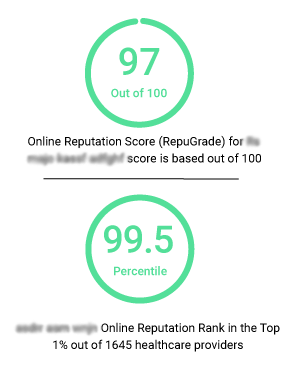How to Develop a Healthcare Digital Marketing Plan That Works

Digital marketing has become crucial for healthcare organizations, helping them connect with patients more effectively. As more individuals search the internet to search for healthcare providers and book appointments, a solid digital marketing plan is essential to stay competitive and visible. Creating an effective healthcare digital marketing strategy starts with a clear, organized plan.
Let's walk you through the essential steps to developing a strategy that engages patients, increases your online visibility, and drives practice growth. This guide will provide actionable insights and industry statistics to help you understand how a well-executed digital marketing plan can lead to measurable improvements in patient acquisition and retention.
Understand the Role of Digital Marketing in Healthcare
Digital marketing in healthcare involves using online tools and platforms to promote services, engage with patients, and build a strong online presence. It goes beyond having a website and includes tactics like search engine optimization (SEO), content marketing, and social media engagement.
# Benefits of Digital Marketing in Healthcare
- Patient Acquisition: Attracting new patients by increasing your visibility online.
- Brand Trust: Building patient trust through informative content and positive online reviews.
- Visibility: This is found when patients search for relevant healthcare services.
- Engagement: Encouraging patients to interact with your practice through social media or email campaigns.
# Common Misconception
Many businesses believe that simply having a website is enough. However, without a strategic plan, a website alone won't drive traffic or convert visitors into patients.
# Boosting Patient Engagement Through Digital Marketing
A well-crafted digital marketing strategy is essential for healthcare organizations, like hospitals or clinics, to boost appointment bookings and improve patient reviews. A strong online presence, supported by effective healthcare reputation management, helps build trust, visibility, and patient engagement. By actively managing their online reputation, healthcare providers can see more positive reviews, strengthen patient trust, and achieve higher retention rates and tremendous success.
Define Clear, Measurable Goals
A successful digital marketing plan begins with defining clear, achievable goals. Setting SMART goals (Specific, Measurable, Achievable, Relevant, and Time-bound) will ensure you are focused on outcomes that will benefit your practice
# Examples of Healthcare-Specific Goals:
- Increase appointment bookings by 30% in the next quarter.
- Get 100 patient reviews within the next 6 months.
- Rank in the top 3 for relevant local search terms like "dermatologist near me.
Align your goals with the broader objectives of your healthcare business, like launching a new service, expanding to a new location, or increasing awareness of a specific treatment.
Identify and Understand Your Target Patient Personas
Patient personas represent the ideal patients for your practice. Understanding who they are will allow you to tailor your content and outreach strategies to their needs.
# Factors to Include in a Patient Persona:
- Age, gender, and location: Key demographic information.
- Health concerns: What types of healthcare do they need?
- Insurance preferences: Do they prefer specific insurance networks?
- Digital behavior: How do they search for healthcare information? What social media platforms do they use?
# Tools to Gather Insights:
Patient intake forms, Google Analytics, surveys, and online reviews can all provide valuable data for building personas.
# Example Persona:
A persona like "Busy Mom in Her 30s Looking for Pediatric Care" can guide content creation focused on convenient scheduling, child health tips, and quick access to pediatric care.
Build a Strong Online Foundation
A professional website is the cornerstone of your healthcare digital marketing plan. It must be user-friendly, fast, and easy to navigate.
# Must-Have Website Elements:
- Mobile-friendly and fast-loading: Essential for both SEO and patient experience.
- Clear service pages: Clearly define your services and provide detailed information about each.
- Provider bios: Include credentials and a welcoming message to build trust.
- Online appointment scheduling: Make it easy for patients to book consultations.
- Patient testimonials: Showcase positive patient experiences to increase credibility.
- HIPAA-compliant contact forms: Ensure all communication complies with privacy regulations.
- Claim and optimize your Google Business Profile: Ensure your practice is listed accurately in local search results.
- Consistency across directories: Ensure your practice's details are consistent across Yelp, Healthgrades, WebMD, and other directories.
Create a Healthcare-Driven Content Marketing Strategy
Content marketing in healthcare is about educating and informing patients. A robust content strategy will help answer patient questions and improve your visibility in search results.
# Types of Content to Include:
- Blog posts: Write posts like "When to See a Cardiologist" or "How to Manage Diabetes."
- FAQ pages: Address common patient questions about your services or conditions you treat.
- Service breakdowns: Explain your treatments and procedures in detail.
- Video content: Share videos explaining procedures or introducing your providers.
Ensure your content follows the E-E-A-T principles for healthcare: Experience, Expertise, Authoritativeness, and Trustworthiness. This will ensure that it is helpful and credible.
# Implement On-Page SEO & Technical SEO
SEO ensures that your website ranks well on search engines like Google. Both on-page SEO (content-related) and technical SEO (site performance-related) are crucial.
# On-Page SEO Basics:
- Keyword optimization: Use keywords naturally within your content.
- Meta titles/descriptions: Write compelling meta tags that encourage clicks.
- Header structure: Use clear headings (H1, H2) to organize content and make it scannable.
- Internal linking: Link to other relevant pages on your website to keep visitors engaged.
# Technical SEO Elements:
- SSL certificate: Ensure your website is secure (HTTPS).
- Mobile responsiveness: Your site should work well on all devices.
- Site speed: Fast-loading websites rank better and offer a better user experience.
- Schema markup for medical businesses: Use medical-specific schema to help search engines better understand your content.
Leverage Paid Digital Advertising (Google & Social Media Ads)
Paid advertising, like Google Ads and Facebook/Instagram Ads, is a great way to reach a wider audience quickly.
# Targeting Options:
- Geo-targeting: Target ads to specific geographic areas where your services are offered.
- Demographics: Target based on age, gender, income, etc.
- Interest-based targeting: Reach patients interested in particular health conditions or services.
# Tips for Effective Ads:
- Keep the ad copy patient-focused, with clear CTAs and highlighted benefits.
- Set a realistic monthly ad budget and track ROI to ensure efficiency.
Strengthen Presence on Relevant Channels
Choose the right social media platforms for your practice. Instagram, Facebook, YouTube, and LinkedIn are popular choices for healthcare businesses.
# Content Ideas:
- Post health tips, patient testimonials, behind-the-scenes glimpses, and service highlights.
- Encourage patients to generate content by sharing photos and reviews and tagging your practice.
Regular engagement with your audience helps build trust and strengthen your practice's online presence.
Email Marketing for Patient Retention
Email campaigns allow you to stay connected with your patients. Use email marketing automation to streamline communication and improve patient retention.
#Types of Email Campaigns:
- Appointment reminders and follow-up emails.
- Newsletters with helpful tips and practice updates.
- Post-visit care tips and wellness information.
Ensure compliance with HIPAA regulations and provide unsubscribe options to stay legally compliant.
Track, Analyze, and Refine Your Plan
Track the success of your efforts using tools like Google Analytics, Search Console, and ad platform dashboards.
#Key Metrics to Monitor:
- Traffic: How many visitors are coming to your site?
- Conversions: Are visitors booking appointments?
- CTR (Click-through rate): How often do people click on your ads or content?
- Bounce rate: Are visitors staying on your site or leaving quickly?
- Keyword rankings: How well are you ranking for important healthcare-related keywords?
Regular reviews and A/B testing will allow you to refine your strategy and improve performance.
Building a Successful Healthcare Digital Marketing Plan with GMR Web Team
A detailed and thoughtful digital marketing plan for healthcare is essential for success in today's competitive landscape. A healthcare digital marketing strategy is an ongoing effort that requires attention and refinement to stay effective. Start with small, manageable steps, and gradually build up your efforts to reach more patients and grow your practice.
If you're unsure where to start or need guidance on optimizing your digital marketing strategy, contact the GMR Web Team. Our experts can help create and implement a comprehensive strategy that is effective in driving patient engagement and practice growth.
Be the first to post a comment



Thanks For Comment